My post from last Friday discussed events leading to the pro-Palestine march on Remembrance Day, Saturday, November 11, 2023.
My October 27 post on how the Middle East conflict is affecting the UK can be found here.
Today’s post outlines this week’s diary of events.
Before I begin, on Thursday, November 9, GB News’s Mark Dolan emphasised that violent protests should not be blamed on Home Secretary Suella Braverman:
On Friday, November 10, an X (Twitter) user questioned Met Police chief Sir Mark Rowley’s logic concerning the upcoming ‘million man’ pro-Palestinian march in London on Remembrance Day:
Remembrance Day
Smaller Remembrance Day events were held around London on Saturday, November 11, before the pro-Palestine march began.
The Telegraph reported, ‘Dignified calm at the Cenotaph a world away from nearby clashes’ (purple emphases mine):
As the two-minute silence ended, wreaths were laid at the Cenotaph in remembrance of those who died during the First World War.
At two minutes past 11, having marked the exact moment the Armistice came into effect, Prof Gary Sheffield, the president of the Western Front Association, set down the first wreath of red poppies at the base of the monument in Whitehall.
He was followed by Tony Bolton, the chairman of the association and Grant Shapps, who was taking part in his first Armistice Day commemoration as Defence Secretary.
Under a clear sky, personnel from the Royal Navy, the British Army and the Royal Air Force watched as the pipes and drums of the London Scottish Regiment played.
As a vigil party was formed around the Cenotaph by the RAF’s King’s Colour Squadron, a bugler from the Royal Marines Band Service played The Last Post …
In the middle of the afternoon, the paper told us, ‘Two thirds of young people don’t know that Remembrance Day marks First World War Armistice’:
The Ipsos survey found that only 33 per cent of millennials, born between 1981 and 1996, and those who are part of Gen Z, born between 1997 and 2012, know which event is remembered on Nov 11.
The poll asked more than 1,000 British adults aged from 16 to 75 which war was commemorated on Remembrance Day …
Millennials and Gen Z respondents were the worst age demographic for responding with the correct answer. That is compared with 53 per cent of Generation X, born between 1965 and 1980, and 62 per cent of baby boomers (born between 1946 to 1964) …
The Baby Boomers figure is shockingly low, too, considering most of their grandfathers would have served in the First World War.
Returning to the day’s events, Housing Secretary Michael Gove had the misfortune of showing up at Victoria Station that afternoon, where a group of pro-Palestinian protesters gathered. The Telegraph told us that he had to be ‘bundled out’ of the station for his safety.
As the protests came to a close in London and in Edinburgh, the paper produced a set of photos, one of which is clearly distressing, as is this one seen on social media.
While ordinary Britons saw a two-tier policing system …
… Channel 4 News said that all the march protesters were peaceful:
That evening, veteran columnist Allison Pearson wrote, ‘Mobs chanting genocideal slogans have free rein on British streets. Enough is enough’:
IT was a tale of two countries. Or of two groups within the same country, barely a mile apart on Armistice Day in central London, but worlds apart in attitudes.
As a military band at the Cenotaph struck up the mellow, moving strains of Our God, Our Help In Ages Past and all the proud medals on all the proud blazers gleamed in the wonderful autumn sunshine, it was possible for a moment to think that this was an England that the soldiers who gave their lives for us would recognise.
But then the thrilling sound of a bugle was drowned out by the thunderous chug of a police helicopter overhead and distantly, very distantly but drawing nearer, came the cry, “Free Palestine!”
I was standing with the British Friends of Israel at the foot of the statue of Winston Churchill (If only the great man were here in the flesh and not cast in bronze to show the present Government what leadership looks like!). Lots of Telegraph readers had travelled from far and wide to join us …
From Kensington, from Yorkshire, from Dorset, from Kent, from Stratford, from Hertfordshire, from Reading, from Belfast, from Swansea; the silent majority of decent people, who agree with Suella Braverman, showed up yesterday, perhaps because they intuited that a mob who were chanting genocidal slogans, driving away poppy sellers from their annual perches, posed an existential threat to their country.
How shameful it was, too, that so many British Jews were too intimidated to venture into the heart of their own capital city. Gary Mond, chairman of the National Jewish Assembly, did come along and movingly, and quite instinctively, the rest of us closed ranks as if to protect him.
As we stood there, people expressed dismay that Sir Mark Rowley, Metropolitan Police Commissioner, had failed to ban the fifth pro-Palestine march through London since the heinous Hamas massacre of Israelis on October 7. And this latest one on a most solemn, sacred day in the national calendar; almost calculated to give offence.
“It’s incredibly disrespectful to Britain,” said a veteran of Asian background who had been coming to the Cenotaph on this same date for 25 years. “This is a Christian country. When my grandfather came to the UK, he fitted in, he didn’t start laying down the law about what he wanted. This is a good country, show some gratitude”. The Home Secretary may have a point when she says the Metropolitan Police have favourites. Peter, a sweet, deeply courteous man who had been helping me hold up the British Friends of Israel banner, popped over to invite a couple of coppers to pose for a picture with our group. They declined.
“They did it for the Black Lives Matter lot, they took the knee to them, didn’t they? We’re not woke enough, Allison,” Peter laughed, bitterly.
And why were so few police officers wearing poppies? It did not go unnoticed. “You’ll wear your Pride patches and badges, won’t you?” jeered Jayne at some passing coppers. Jayne complained how hard it had been to get across town, passing stall after stall selling Palestinian flags …
Unfair or not, yesterday there was a widespread perception of double standards when it came to policing the two countries. Did 92 arrests of “counter-protesters” accurately reflect the balance of offence and disturbance caused or did it tell us which group the Met feels more confident arresting?
As I left Westminster, walking through what felt like a heavily militarised city, I ran into the vast pro-Palestinian march snaking around Victoria station. It was alarming. Some of the men were hooded and masked illegally.
Others in London carried anti-semitic placards and chanted, “Khaybar ya yahood” which my friend said refers to a seventh-century massacre of the Jews. “No offences were committed,” said the Met.
It was a tale of two countries …
That evening, The Telegraph View was entitled, ‘A day of chaos that shamed Britain’:
Today, on one of the most sacred days in our nation’s calendar, the streets of our capital city were marred in two different ways. A crowd of opportunistic far-Right thugs clashed with police near the Cenotaph, attacked the authorities in other places, attempted to disrupt the pro-Palestinian march and yelled “England” during the wreath-laying. These and other acts of disruption made a mockery of their claim to be defending the solemn celebration of a hard-won peace. Close to 100 were rightly arrested.
Elsewhere, the massive march for the Palestinian cause, supported strongly once again by the hard Left, contained within it many acting in an openly anti-Semitic fashion, including displaying grotesque caricatures of puppetmasters, references to Zionism as a disease and other racist imagery. Some carried placards and recited chants that called for Palestine to be free “from the river to the sea”. This is widely understood as a call for the elimination of the state of Israel and the murder or total displacement of its seven-million strong Jewish population.
It was good to see the Prime Minister call this out in his statement where he rightly made an equivalence between the far-Right thugs and the pro-Hamas sympathisers. He called particular attention to the deplorable fear and intimidation imposed on the Jewish community this weekend. The police must act against those who used the protest to glorify Hamas or demonise Jews. It is extremely important that anti-Semitism is cracked down on as much as the far-Right mob.
… It is clear that this pattern of protests cannot go on. Every Saturday cannot be marred by such scenes. Some have tried to make cheap political capital by blaming the presence of the far-Right on a recent opinion piece written by the Home Secretary. This is nonsense, and a straightforward attempt at undermining Suella Braverman, whose views on the protests are very closely aligned to those of Tory voters and, in many cases, to the electorate …
A Sunday Times article noted, ‘Hate, intolerance and arrests as thugs hijack Armistice Day’:
Rishi Sunak has told the Met commissioner he expects the far-right “thugs” and “Hamas sympathisers” who clashed with police during violent protests in the capital to face the “full and swift force of the law”.
The prime minister said he will meet Sir Mark Rowley again in “coming days” and repeated his threat to hold him to account for his decision to approve the controversial pro-Palestinian demonstration on Armistice Day.
It was the fifth to have taken place since the October 7 massacre perpetrated by Hamas in Israel but by far the most violent, with 126 arrests by 9.10pm and nine police officers injured. Last Saturday the number of arrests totalled 29 …
Just after midnight, The Sunday Times posted, ‘Suella Braverman’s rhetoric leaves her in the cold, but Rwanda may save her?’
It says, in part:
Rishi Sunak was in his Downing Street study on Wednesday night when he saw the article in The Times by his home secretary that accused police of “playing favourites” with protesters.
Only hours earlier he had had what sources described as a “constructive meeting” with Sir Mark Rowley, the Metropolitan Police commissioner, to discuss this weekend’s pro-Palestinian demonstrations. The statement issued by the PM afterwards, when he defended the right to peaceful protest, had been jointly agreed.
Sources say Braverman’s incendiary comments have plunged relations between her and the PM further into the deep freeze.
Sunak, whose allies claim he has a “professional relationship” with Braverman, did not speak to her for 24 hours after The Times article appeared.
A former cabinet minister said: “It’s a dysfunctional relationship. But he has given her [Braverman] the benefit of the doubt too often so it must be a convenient political one. He [Sunak] doesn’t trust her. He put Robert [Jenrick] into the department to oversee her and [Oliver] Dowden has been chairing the emergency Cobra meetings on the protests” …
Since No 10 broke established protocols to reveal that it had not cleared the article, not a single cabinet minister has offered Braverman their support …
Braverman’s public attacks on Rowley have angered a number of her ministerial colleagues …
While acknowledging tensions, one of Braverman’s allies pointed out that the Met had been notified in advance of the article and the home secretary and Rowley had spoken on Friday evening …
However, others believe that Braverman is looking for a way out of government. One said that doing so would allow her to escape the backlash that will follow if the government’s immigration plans unravel. That could happen as soon as Wednesday, when the Supreme Court rules on whether the Rwanda plan to deport migrants is lawful.
It is understood that Downing Street has a “low expectation of success” and the Home Office is drawing up contingency plans in the event it loses the case …
Regardless of whether Braverman’s support is waning, Sunak appears to have decided to play for time. A source said there had been discussion about whether to sack her on Thursday, but that calmer heads had prevailed …
Remembrance Sunday
As we remembered our war dead for the second day running and as the official commemoration ceremonies took place at the Cenotaph, attracting around 10,000 veterans, their families and friends in the march past, various photos of Saturday’s march appeared online, two of which follow.
I thought it was against the law to walk around with one’s entire face covered. Perhaps not:
This one reminded me of turkeys voting for Christmas:
That evening, The Telegraph reported on the Metropolitan Police’s response to their officers posing with the child:
Scotland Yard has apologised after officers posed for a photograph with a masked child holding a pro-Palestinian placard during the march on Saturday …
The child can be seen wearing a chequered red and white keffiyeh, a scarf associated with those of Palestinian sympathies, over his nose and mouth …
The image quickly spread across social media with some users of X, formerly known as Twitter, questioning why the officers had agreed to pose alongside a “mini terrorist”.
The Metropolitan Police admitted that “it was not advisable for the officer to agree to pose for the photograph.”
The force, however, stressed no action would be taken against the officer as they had been “trying to positively engage” with the protesters.
In Morden, south London, someone rubbed out John Maxwell Edmonds’s famous Great War poem which Tube staff had neatly penned on a whiteboard.
The poem, adorned by three paper poppies, read:
When you go home, tell them of us, and say,
For your to-morrows these gave their to-day.
The Telegraph reported, complete with before-and-after photos:
But on the station sign, someone wiped out the last line.
And removed the poppy flower above that line.
Who does that sort of thing?
The article continues:
Images from earlier in the day show the four-line poem in its full glory, with the words “Lest we forget” added beneath and poppies stuck close by.
Morden Station posted on X, formerly Twitter: “And this is the respect the youth of today have!!! Absolutely disgusted.”
Merton Police replied: “Seen and noted. @BTPLondon [British Transport Police] can you assist with this?”
“Disgusting,” one person said on X.
“I hope you have rewritten the words – don’t let them win,” another retorted.
One added: “Hope you put your words back on, don’t be put off and stick with it.”
But others said that although it was upsetting, they took issue with generalisations about young people.
“Kind suggestion not to generalise, many younger ones also out today,” one said …
And another said: “Whoever did this – awful. How do we know it’s a youth?”
Transport for London has been contacted for comment.
We have never seen a Remembrance weekend like this before. I hope sincerely that this is a one-off. It was heartbreaking.
Dave Atherton has a video of a couple getting verbal abuse at Waterloo Station for wearing poppies:
There was another incident at Waterloo Station that day. The Mail reported:
Police are searching for four men over a ‘racially aggravated altercation’ after video showed them hurling abuse at pro Palestine protestors at Waterloo station in London.
The British Transport Police launched an appeal on social media in an attempt to identify the men who were filmed as 300,000 people descended on the country’s capital for an Armistice Day protest amid the Israel and Hamas war.
The force said officers were looking to speak to the individuals in the images ‘who they believe may have information that could help their investigation’ …
And what is is now with so many in the British media referring to ‘Armistice Day’ instead of Remembrance Day?
A Telegraph article stated that Met Police were also in search of pro-Palestinian protesters, one of which had an offensive poster of Suella and Rishi:
… In a thread on X, formerly known as Twitter, the Met Police said it was looking to identify individuals in photos being shared on the platform following Saturday’s demonstration …
Suella took to social media in response. The Express reported:
Home Secretary Suella Braverman has made it clear she will use emergency powers to prevent “sick” pro-Palestinian marches from continuing in Central London after a weekend of chaos.
Following the Metropolitan Police’s failure to take action on Saturday as marchers chanted anti-Semitic slogans, carried anti-Semitic and racist banners, threatened minister Michael Gove and harassed members of the public, Ms Braverman has warned: “This cannot go on!”
In a post on X (formerly Twitter), she said: “Our brave police officers deserve the thanks of every decent citizen for their professionalism in the face of violence and aggression from protesters and counter-protesters in London yesterday. That multiple officers were injured doing their duty is an outrage.
“The sick, inflammatory and, in some cases, clearly criminal chants, placards and paraphernalia openly on display at the march mark a new low. Antisemitism and other forms of racism together with the valorising of terrorism on such a scale is deeply troubling” …
Interestingly, in France, protests took place in support of Jewish people and against anti-Semitism. EuroNews reported:
More than 180,000 people across France, including 100,000 in Paris, marched peacefully on Sunday to protest against rising antisemitism in the wake of Israel’s ongoing war against Hamas in Gaza.
Prime Minister Elisabeth Borne, representatives of several parties on the left as well as far-right leader Marine Le Pen attended the march in the French capital amid tight security.
The march was preceded by approximately 70 other rallies arranged across the country …
Monday, November 13
The Mail‘s Monday headline clearly supported Home Secretary Suella Braverman, who has opposed these marches from the beginning:
Unfortunately for the public and for Suella, Prime Minister Rishi Sunak decided to sack her in a wide-ranging pre-election Cabinet reshuffle.
The first two journalists out of the gates with this bit of breakfast news were The Times‘s political editor Steven Swinford …
… and the BBC’s political editor Chris Mason:
Armed Forces minister James Heappey had the newsround that morning. Poor man. He had to answer all manner of questions about things he could only speculate on.
Suella’s sacking seemed to focus on the article about the Middle East protests she had written for The Times at the end of last week, which I covered last Friday. The Telegraph reported on one of Heappey’s breakfast interviews:
James Heappey, the armed forces minister, said it would be “incorrect” to blame Suella Braverman for counter-protests to the pro-Palestinian march which took place on Armistice Day.
Asked how much of the disorder at the weekend could be laid at the Home Secretary’s door, Mr Heappey told Times Radio: “I wouldn’t have used some of the words that the Home Secretary used in her article but I also think that it would be incorrect to say that those protests, the counter protests, were entirely a consequence of what she wrote …”
Heappey added that any counter protests would have already been planned before The Times article appeared.
An hour later, at 9:20, The Telegraph had a more detailed account of Suella’s sacking:
A government spokesman said on Monday morning: “Rishi Sunak has asked Suella Braverman to leave government and she has accepted.”
Mrs Braverman said: “It has been the greatest privilege of my life to serve as Home Secretary. I will have more to say in due course.”
The Home Secretary’s position had been under pressure since last week when she wrote an unauthorised article in which she criticised the Metropolitan Police for a “double standard” over their handling of protests.
She also attacked “pro-Palestinian mobs” and said protest scenes were “disturbingly reminiscent” to those seen in Northern Ireland.
Mrs Braverman was accused by some of exacerbating tensions and for some of the extreme-Right violence seen at Saturday’s Armistice Day events in Whitehall …
Armistice Day again!!
The article ended with this:
A No 10 source said: “Suella has gone because the Prime Minister wants a united team to deliver the changes this country needs for the long term.”
Just before 9 a.m., The Sun‘s political editor Harry Cole tweeted that Foreign Secretary James Cleverly would succeed Suella as Home Secretary:
More on that in a moment.
YouGov were quick to poll a selection of the British public that day. By 3:30 p.m., the results were in.
Guido Fawkes reported:
A new YouGov poll shows 57% of the public think Rishi was right to sack Suella Braverman, compared to 20% who thought it was the wrong decision.
I wonder. Even the conservative YouGov leans leftward in their sampling.
Conservative MP Andrea Jenkyns submitted a letter of no confidence to the 1922 Committee regarding Rishi. Guido has the full text of the letter, excerpted below (emphases in red his):
Jenkyns calls Rishi “machiavellian” in getting rid of Boris, and says Braverman was the only person left “with the balls to speak the truth“. No punches pulled…
Sir Graham Brady heads the 1922 Committee. Jenkyns expressed her disappointment:
Dear Sir Graham,
Enough is enough. If it wasn’t bad enough that we have a party leader that the party members rejected, the polls demonstrate that the public reject him, and I am in full agreement. It is time for Rishi Sunak to go.
Rishi’s Machiavellian involvement in getting rid of our democratically elected leader Boris Johnson, who bravely fought for Brexit when parliament was in deadlock. Yes Boris, the man who won the Conservative Party a massive majority, was unforgivable enough. But then to purge the centre-right from his cabinet and then sack Suella who was the only person in the cabinet with the balls to speak the truth of the appalling state of our streets and a two-tier policing system that leaves Jewish community in fear for their lives and safety.
And the King’s Speech; we should have had a barnstorming speech that would have strongly set out our stall ready for the General Election that defines our true Conservative values. To be 20 points plus behind in the polls and by-election defeat after defeat. How long are MPs going to sit on their hands and let he and his out-of-touch advisors damage our party irrevocably?
I therefore submit this letter of no confidence in Rishi Sunak as our Conservative Party leader.
I do this to stand up and fight for true Conservatism, we must be a party that delivers low taxes, be trusted on the economy and turbo charge our skills to power our economy. We must be strong on law and order, take control of our borders, be energy independent as a nation and stand up for our freedom of speech. I hope other Conservative MPs follow suit, this is our last chance, to stop Starmer, the man who tried to put Jeremy Corbyn into Number Ten, we need to stop his socialist cabal, who will change the face of Britain beyond recognition.
As bad as Suella’s departure was, a shock development took place which had me double-checking the calendar to make sure it was not April 1: the return of former PM David Cameron as Foreign Secretary, replacing James Cleverly, the new Home Secretary.
I checked Guido during breakfast to find out that Cameron, a supporter of both the EU and China, had entered Downing Street by 9:30 a.m.:
But I asked myself how would it all work? Cameron — famous for his catchphrase ‘Call Me Dave’ — is not an MP. He is a private citizen.
Guido explained that Dave, or Call Me, would have to be made a Lord — a life peer — in order for him to take up the post. Guido also reminded us of Dave’s recent scandal:
The Former PM David Cameron is back, with Rishi appointing him as Foreign Secretary in a shock move that will provide much controversy amongst Tory MPs. He’ll have to be made a Lord first, as he’s no longer an MP. Cameron had to resign after losing his campaign to stay in the EU, and was recently caught up in the biggest lobbying scandal in Britain for decades when the FT revealed that he had secretly lobbied former colleagues in government on behalf of his employer, Greensill Capital.
There is historical precedent for someone from the House of Lords to serve in a Prime Minister’s Cabinet. For a private citizen like Call Me, the King would have to grant a life peerage. In this case, it was no sooner said than done — and before 10 a.m.:
The difficulty is accountability. Each of the Houses of Parliament is independent and is referred to as ‘the other place’. As such, a member of the Lords never appears in the House of Commons and vice versa. Lord Cameron will be represented in the Commons at the despatch box by a senior Foreign, Commonwealth and Development Office minister.
The aforementioned YouGov poll showed that the public were unhappy with this prospect:
Only 24% of voters believe that appointing the former PM David Cameron was a good decision, compared to 38% thinking it was a bad decision. However, voters seem fairly split on whether Cameron will do well as Foreign Secretary, with 36% saying he will do badly or fairly badly, and 31% believing he will do well or fairly well. Cameron’s appointment is quite the climb down from Sunak’s previous attempts to distance himself from 13 years of Tories…
Even worse would be a return of Sir Tony Blair. Recall that David Cameron referred to himself as ‘the heir to Blair’ prior to his victory in the 2010 general election.
The Guardian reported (bold in the original):
Tony Blair has let it be known that he is available if needed to help in an effort to end the growing crisis in Israel and Palestine. His office, however, denied a report in the Israeli press that he had already been offered a specific job. Blair has built extensive contacts in the Middle East, and he worked as special envoy for the Quartet – the UN, the US, the EU and Russia – after leaving No 10 in 2007, trying to build the Middle East economy.
This is what the Times of Israel had reported about Blair:
That evening, The Guardian summarised the day’s events — also referring to Armistice Day:
Andrea Jenkyns, a noted supporter of Boris Johnson who served as schools minister under Liz Truss, tweeted her letter to the party’s backbench 1922 Committee, saying: “Enough is enough … It is time for Rishi Sunak to go and replace him with a ‘real’ Conservative party leader.”
Braverman supporters stressed they did not expect significant immediate pushback against a cabinet that took a notable step to the centre with her departure and the unexpected return of David Cameron, but the former home secretary is unlikely to stay quiet.
Shortly after Sunak sacked Braverman after accusations that her rhetoric had inflamed tensions over violent Armistice Day protests, the latest in a series of challenges to the prime minister’s authority, she said she would “have more to say in due course”.
There is widespread expectation that she will unleash another eviscerating newspaper article, positioning herself as a figurehead for right-leaning Conservative MPs.
The New Conservatives, a populist-leaning alliance of MPs led by Danny Kruger and Miriam Cates, met in parliament on Monday evening. One source said Braverman’s sacking was not on the official agenda, but “I doubt we will even get to item one” given the likely focus on the reshuffle.
After the meeting, one MP said they had questioned whether the government was “going to embrace the realignment” of post-Brexit politics or not.
About a dozen rightwingers in the New Conservatives faction, which included the party deputy chair, Lee Anderson, and Braverman’s ally Sir John Hayes, were said to be “far from pleased” as they gathered for a meeting in the Commons …
One MP who supports Braverman said Sunak had misjudged both his MPs and voters by removing her: “Suella is popular. The political establishment might tut about her views on protests, but our constituents agree. Rishi might have created a problem for himself. She will become a rallying point.”
On GB News that day, I saw a video of Rishi with Sir Mark Rowley. The two of them walked through part of the Met’s headquarters together that day, smiling and conversing in a friendly manner. This tells me that Rishi will have a hands-off policy with regard to two-tier policing.
I have much more to cover here from this week, but it will have to wait until Monday.
I will close with a moving article from The Times, ‘I tell my children not to talk about being Jewish when we’re out’:
Last week a friend picked up the phone to me: “They called her ‘dirty Jew’,” he said. “On the Tube.” “Her” is his four-year-old daughter.
I felt sick as the words — relaying a story that has become too horrifyingly familiar to Jewish parents in Britain this past month — rushed from his mouth.
A woman had given up the end seat on their packed District Line carriage as they travelled home from Hammersmith to east London at 6pm. His daughter was hot and, although he’d encouraged her not to take off her coat, heeding advice from her Jewish primary school that it might be unsafe for pupils to reveal the Star of David on their uniforms just now, she needed to cool down and wriggled it off her shoulders. As the train pulled into Monument station he heard the words, loudly, clearly: “Dirty Jew”, a man said. “He was maybe 50, he said it to my little girl, then got off and disappeared into the crowd,” my friend told me. She’d just received her first gold achievement award in reception class at school — it should have been a good day. But now he couldn’t wait to get her off the train and into the safety of home, away from hate. “I’m so angry,” he said. “But mostly I’m just sad. To make it worse, no one in the carriage said a thing.”
From the moment that Hamas massacred 1,400 people in southern Israel and took some 240 hostage, including babies and children, on October 7, antisemitism — racism against Jews — began soaring to now unprecedented levels in the UK.
In the five weeks since, as conflict rages in Israel and Gaza, where Israel’s heavy bombardment has led to devastation and the death of more than 10,000 Gazans (almost half of whom are children), according to the Hamas-run health ministry, antisemitic incidents in Britain have climbed by more than 500 per cent (rising to 1,300 per cent in London), according to statistics logged by the Community Security Trust, the charity tasked with keeping British Jews safe. More were committed against schoolchildren in one month than in the first six months of the year. These are children like my friend’s — like my own.
I am a mother to three Jewish boys, all under 11 years old. These past few weeks I have had fearful conversations with them that have eclipsed the worries I held for their safe upbringing in Britain.
As I stepped on to the bus with them last week, I held my finger to my lips: “Shh.” We take that bus, from our home in south Manchester into town, frequently. “I’m sorry I have to tell you this,” I had explained before we left the house, “I don’t want to. But sometimes, for safety, we just have to do things differently. It’s best if we don’t discuss being Jewish when we go out.” How were these words leaving my mouth?
“Is it because of the war?” my nine-year-old middle son asked. “Yes,” I replied. What else could I say? How on earth do I teach my sons, in whom I try to instil tolerance and kindness, that antisemitism is surging around them and I cannot stop it?
On the bus I distracted them as we rode past the bus stop where “kill more Jews” was scrawled across a flyer earlier in the week or the one where hostage posters of Jewish-Israeli children have been defaced and torn down …
I did something else too: I looked around and decided whether it was safe to call my eldest son by his name, the one I chose because it holds his Jewish heritage. Sometimes now, in public, I feel I’m doing a better job of protecting him if I don’t.
The next day, on the walk to their middle-class, non-Jewish school, I hope that they haven’t noticed the two parents who have previously spoken to me but now divert their gaze when I say hello. The same thing happened the last time Israel-Gaza violence flared, in 2021. I fight back tears when it happens; I feel annoyed …
Antisemitism is not new to us but it has never felt so suffocating. In 2021 my eldest, then eight, was told by schoolmates “we hate the Jews” as he tried to join a playground football match. This time, 24 hours after the massacre, I saw one of those boys, along with another my son considers a friend, in news footage of a march in which people celebrated their “joy and pride” at what Hamas had done. I know they are not learning this at school, where there is zero tolerance for racism, so I fear for what they are being taught at home before they share classrooms with my own children.
Recently at Channing, a private girls’ school in north London, a swastika and “kill the Jews” was daubed on a lavatory cubicle. A friend messaged wondering how to support her 15-year-old son, in another private school, whose history classmate had told him: “Hitler was a great man.” These incidents are so frequent and fleeting that children do not always report them to teachers or have the evidence to do so; when they do, schools are mostly tough on educating perpetrators. Many friends with older children have restricted their social media use, fearful of them seeing the many memes glorifying terrorism and racism.
Among the hardest parts is that many of us are trying to guard our children against antisemitism on top of supporting friends and family in Israel who are grieving and living through war. There are those among us here who are mourning loved ones too …
… hate helps no one …
There is one thing that makes this easier: when others speak up. When non-Jewish fellow parents and friends message me checking in or asking if my kids are OK, their small act of kindness overwhelms me, so used have I become to guarding against silence. My family of five descends from Jews who fled antisemitism in Iraq on one side and Nazi Germany on the other, both within living memory.
It’s hard not to be chilled by the echoes of where complicit silence can allow hate to go. Sometimes the racism playing out here feels like the loudest, loneliest thing in my mind; then, sometimes, I receive a message like the one I did last week, from the mother of my son’s friend: “I wanted to extend a hand to you from across the divide of faith. I just wanted to send love.”
I hope that Rishi and Sir Mark read that story when it appeared on Monday, the 13th and ponder the heavy implications of light policing.
More to follow next week.

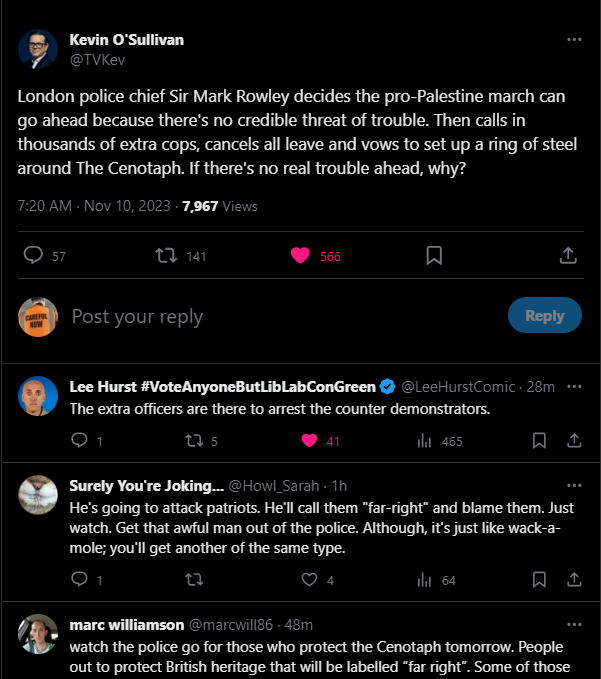
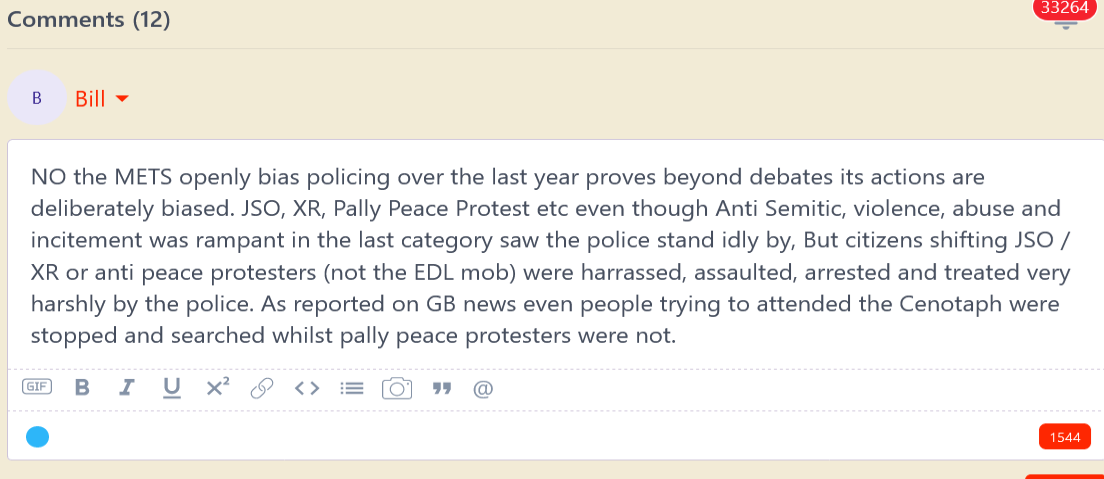
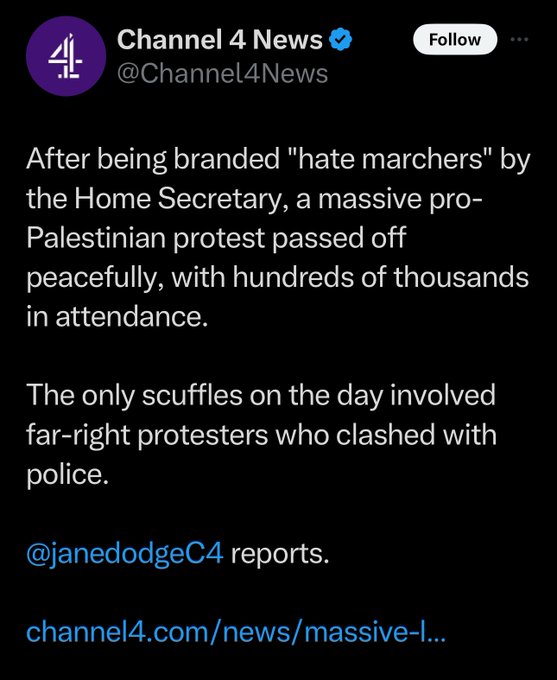
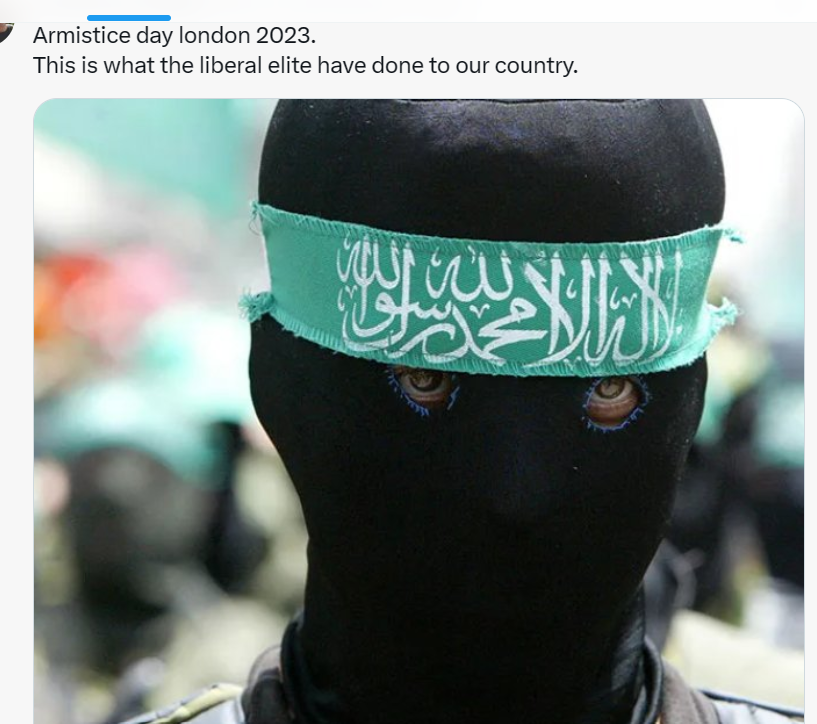
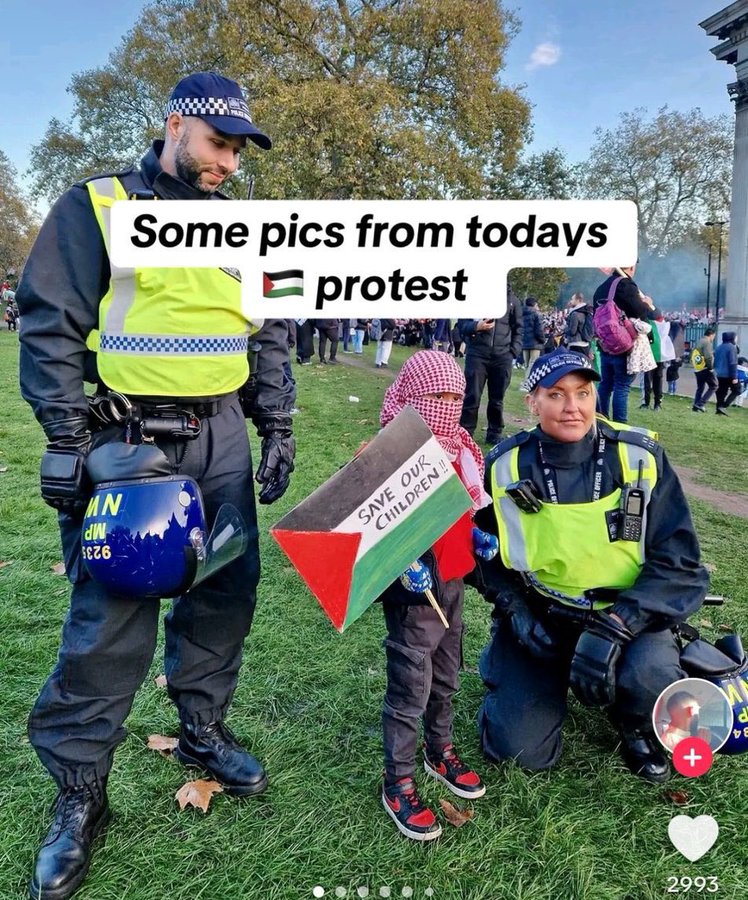
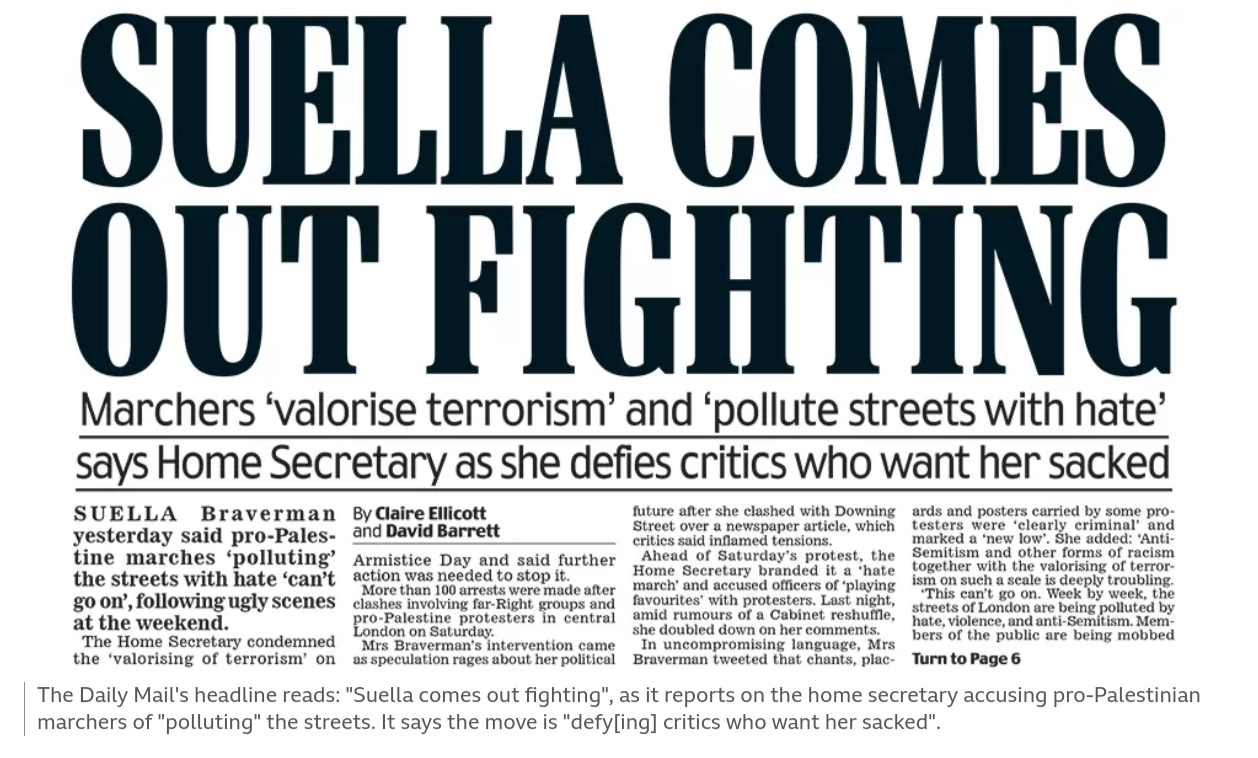
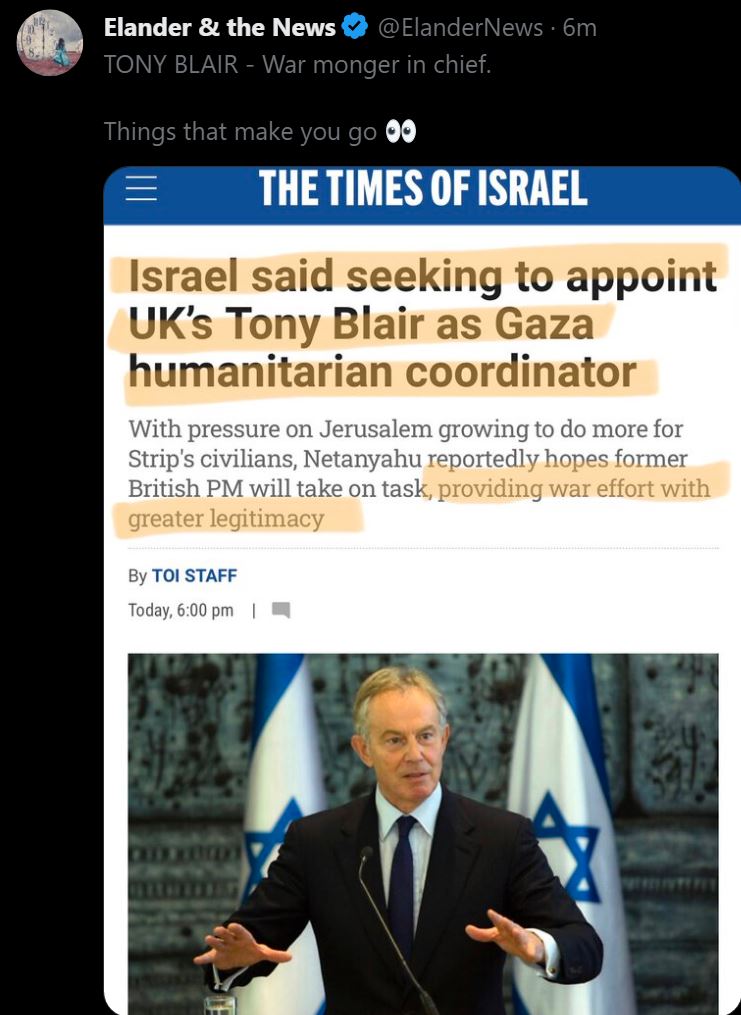




8 comments
November 17, 2023 at 9:20 pm
R. Christopher Hickok
Mass rejection of history seems to have been achieved. “Least we forget” is generally unknown in the West, far as I can see.
LikeLiked by 1 person
November 18, 2023 at 12:36 pm
churchmouse
Perhaps now, sadly.
‘Lest we forget’ was well adhered to when I was growing up ‘so last century’. How things have changed within the last 30 or so years. As you so rightly put it, a ‘mass rejection of history’. I think this is largely a by-product of peace in the West: an unintended consequence of good intentions.
LikeLiked by 1 person
November 18, 2023 at 12:40 pm
R. Christopher Hickok
And relativism. Carl Trueman is a good analyst in this case. Look him up.
LikeLiked by 1 person
November 18, 2023 at 3:01 pm
churchmouse
I read a lot of Carl Trueman’s work several years ago. I must look him up again. Many thanks.
LikeLiked by 1 person
November 18, 2023 at 2:55 pm
dearieme
“largely a by-product of peace in the West: an unintended consequence of good intentions.” Nah, the intentions were evil.
Telegraph, 23/10/2009:
The huge increases in migrants over the last decade were partly due to a politically motivated attempt by ministers to radically change the country and “rub the Right’s nose in diversity”, according to Andrew Neather, a former adviser to Tony Blair, Jack Straw and David Blunkett.
He said Labour’s relaxation of controls was a deliberate plan to “open up the UK to mass migration” but that ministers were nervous and reluctant to discuss such a move publicly for fear it would alienate its “core working class vote”.
As a result, the public argument for immigration concentrated instead on the economic benefits and need for more migrants.
LikeLiked by 1 person
November 18, 2023 at 3:07 pm
churchmouse
Thank you kindly.
I was talking about the benefits of ‘no more war’, what is referred to as ‘peace’, although it is but a kind of peace, seeing as how divided we all are. Yes, of course, the lack of war brought us many good things but it also caused us to forget the essentials of our history. For some that was an accident. For others it was a handy opportunity; nature abhors a vacuum.
As for migration, I have not forgotten Andrew Neather in the slightest. However, even there, we have Westerners who sincerely believe it to be helping others — ‘asylum seekers’ themselves and the general indigenous population. (Sigh.)
LikeLike
November 20, 2023 at 9:00 pm
Middle East protests: Met Police and protesters 1, Suella Braverman 0 — part 2 | Churchmouse Campanologist
[…] my post from Friday, November 17, much more followed on the Middle East protests in the United Kingdom and on Suella Braverman last […]
LikeLike
November 21, 2023 at 9:01 pm
Middle East protests: Met Police and protesters 1, Suella Braverman 0 — part 3 | Churchmouse Campanologist
[…] past two posts on how the Middle East conflict is affecting the UK can be found here and […]
LikeLike